- Home
- Harlan Ellison
Slippage: Previously Uncollected, Precariously Poised Stories Page 23
Slippage: Previously Uncollected, Precariously Poised Stories Read online
Page 23
Turned the beams loose on full, and just swept the goddam town. That wasn't smart. First thing they tell you in Sapper school is, "Don't ever get close enough to see them burn."
I got too close. First time I ever saw anything like that. Wasn't like what they'd taught us it would be. There were old guys like my Grampa Louie, and old women, and kids, and those dog-things they keep for pets...and all of them splitting and popping like bags of pus. They'd bubble and the eyes would explode from the inside. The hair sizzled and the gold skin split, and you could see bone for a second before it all turned black and they fell in like finishing a bag of popcorn and crushing the bag in your hands. I saw a kid, a little girl, I guess, and she looked straight into the screen as I passed over, and she opened her mouth to scream, and her mouth just kept going, right across her face, and then the bottom came away, and she was running in circles and flapping her hands, and I saw all her parts before they turned into stew.
You motherfuckers never told me about that part of it, did you?
Never told me they look a lot like us. Oh sure, they got golden skin, and those eyes, and the little worm fingers. But they're not like the ghosters you showed us! They're not, are they? Where's the guy who phonyed up those Kyben monsters for the bond drive ghosters, for the holos that got all of us to join up before we'd learned to wipe our asses? Where is that talented sonofabitch? I'd like to give him an Oscar. 'Cause they don't look like that!
I'm okay.
Gimme a minute. Just to clean up.
Yeah. Swell. I'm just swell.
I did the job for you. That kid would never invade old Earth. Took her right out.
But it was the old ones that did it to me. The old ones just like my Grampa Louie, that I adored. You should see what old Kyben have inside them. A lot of stuff that wriggles before it bursts. I guess that was what the guy who phonyed up the monsters meant to show, but he never got any closer to the real thing than any of us do. We just hang out there in space and dump. And when the Sappers go in, it's whambam and out so fuckin' fast all you see is a new sunrise.
The old ones. Gawd, it was just swell. Just...swell.
And I was a hero. Like my Grampa Louie.
I got a citation, and a month Earthside.
They snapped me back through inverspace, and I got scrip for a thirty-day repple-depple, and I went home.
It was all I could do to face my family. I wanted to puke. They couldn't stop showing me off to the neighbors. And when the ghosters came to interview me, I just said I was too whacked to talk, and they ran all that bullshit my family put on like the Sunday tablecloth, and I just sat there and stared.
For a day and a half I didn't have the guts to go up and see Grampa Louie. But finally, when I couldn't stand it any more, I knew I had to go tell him I wasn't like him, that I'd come to hate it, and take what he had to say, and just swallow it. But I knew in my heart that I was no more a hero like him than I was an angel. So I went up.
At first he wouldn't unlock the door.
"Grampa, jeezus, I got to talk to you! I'm in Hell, Grampa!"
And he opened the door, and looked at me with his last good eye, and the bullet train scars so red and painful looking, and he was a lot older and closer to the dust than I'd ever seen him. And he was crying. He was crying for me.
And I came through and his old, thin body was around me, him hugging and whispering stuff, and I just laid my head on his shoulder and let it all go.
After a long time we sat down on the edge of his bed, and he told me to tell him all of it. So I did, with snot running down my face, and my hands making these stupid gestures in the air, me trying to grab onto something wasn't there, and Grampa Louie overflowing, too.
And when I got done, and couldn't even gasp any more, he said, "It was a long time ago, and I don't know if it was Pope Gregory XI or Innocent II, I've heard it both ways; but it was in the tenth century sometime. They invented the hand crossbow. It was so awful a weapon that the Pope, whichever one it was, he said, 'This weapon is so horrible that it will surely end all wars,' and he wouldn't let them use it. At least for a while. Then they decided that as terrible as it was, Christians couldn't use it against each other...but they could kill the lousy Mohammedans with it."
He looked at me. "You know what I'm telling you, Del?"
I said I knew perfectly, what he was telling me.
Then he told me something no one else but him in the whole galaxy knew. Something he'd wanted to take to the grave.
And I loved him more, and hated him more, and suffered with him more, and despised him more, than I had ever loved and hated and suffered with or despised anyone in my life, except myself. "What'm I gonna do, Grampa?"
So he told me what to do. What he would've done twenty years ago, but didn't have the courage to do, especially since he was a hero.
And that's what I did, you Officers and Gennulmen. I cut out during Molkey's Ash, and I kept going. Maybe before you toss me into the starfire chamber you'll confide how it was you tracked my ass down, and maybe you'll keep it to yourself. But I'll make you a deal.
You tell me how you found me, and I'll tell you what Grampa Louie told me that was a secret. Whaddaya say?
Aw, hell, c'mon. What've you got to lose?
We got a deal?
You'll keep your word? Sure, I know you will. You're Officers and Gennulmen, and we're all just grunts in the TEF, right? So, okay, here it is:
Grampa Louie just hated it when I'd drool over his model up there on the Wall. Used to drag my scrawny kid's ass away as fast as he could, not because he really gave a damn that someone might spot him and make a big who-struck-John about him being the hero of the Pleiades, but because he knew he was a fraud. He was a killer, and you're killers, and me, I was a killer, too.
He hadn't gotten those blast scars in battle. He'd gotten them from the Kyban woman he was trying to stick it up the ass of. There wasn't any sex in it. He was just horny, and he'd been out there forever, and he didn't give a shit what it would do to her, or anything. He was just the kind of guy you train us to be. Real grunts.
And she burned him. And he stomped in her head with a boot just like that boot he's wearing up there on the Wall you all admire and drool over so much. He just smashed in her head like that Kyban battle bonnet on the sculpture.
My Grampa Louie was just like me. Just like me. One of the few, the proud. The shit you made believe all that hail to us ain't we the best in the universe crap!
Get out, Del. That's what my Grampa Louie told me. Get out before they make you what I am, before they kill you and you never get a chance to say you're sorry. Because there's no way to say I'm sorry. And there's no way to get over hating yourself for being so goddam dumb that you buy into all that kill the Mohammedans bullshit. Get out, kid. Hightail it, get out, and don't stop.
So now I'm getting hoarse, and that's my tale, Sirs.
Now you gonna tell me how you tracked me?
You gonna tell me in exchange for the honor of my Grampa Louie, who put a squirtgun on that goddam Wall the week after I shipped out again, and blew a chunk out of it before the cops wasted him, not knowing he was the guy up there on the sculpture? You ready to tell me?
Well?
Whaddaya say? I'm waiting.
What...? You what!?
Why, you sonsofbitches, you no-good rotten bastards?
Right into the starfire?
You bastardsl
You lied to me! You lied to me.
The Deadly “Nackles” Affair
a true tale of action, danger; duplicity, and the Search for Literary Excellence in the nterhworld of television, with a Stern Moral about ethics and a reminder that a loaf of bread doesn’t cost 13¢ any more
Andre Gide wrote: “Everything’s already been said, but since nobody was listening, we have to start again.”
(You can use that the next time some spud tells you it isn t worth being a writer, because Shakespeare created all the basic plots, and all that's left
to us is rewriting what has already been done perfectly.)
The mistake we all make is in assuming anybody remembers anydamnthing from one day to the next. If that were true, we'd stop getting involved with approximately the same kind of wrong lover each time, we'd learn the lessons of history, the death penalty would discourage those plotting murder, and George Santayana's famous quote would be about as popular as "the bee's knees." But few of us keep accurate records of what we've learned as we hobble through life barking our shins in the dark on experiences we've already had; we have no tickler file to point out the similar traps of Korea and Viet Nam, of Joe McCarthy and Jerry Falwell; and as Olin Miller has so aptly noted, "Of all liars, the smoothest and most convincing is memory."
Thus, I must remind myself that though I have written two books of essays on the subject of television (concluding that to work in television is akin to putting in time in the Egyptian House of the Dead), and subsequently wrote a long essay as introduction to my 1978 collection, STRANGE WINE (in which I vowed on peril of losing my immortal soul that I would never again work in television), there may be at least tens of thousands of readers of this essay who remain unaware of my loathing for the coaxial medium, and who know not that my going to work in November of 1984 for CBS's revival of The Twilight Zone caused some small, but significant, tremor of confusion among the faithful. After all, hadn't I inveighed against television for a decade and more? Hadn't I advised viewers to kick in the picture tubes and use their sets as planters? Hadn't I grown to be the specter at the banquet, doomsaying brain damage and tertiary blandness for all of you out there sucking up them good ole phosphor dots?
Well, you can just imagine what happened when it was announced that I was returning to tv, to work as Creative Consultant on The Twilight Zone! Such hue and cry, such sturm und drang, such death and transfiguration. You'd have thought that a simple mention in TV Guide was more unsettling than The Zimmermann Telegram!
Explaining what I was doing toiling for a year in the hold of the television trireme, for those who don't remember (and don't give a hoot), leads to an explanation of why I left The Twilight Zone's employ, for those who are delighted to see the teleplay of "Nackles" published here. And all of it, from joyous opening credits to shabby fadeout, circumnavigates the core fact that neither you nor I remember the past and thus are condemned to repeat it.
I worked for more than a decade in television. I won a number of awards doing it. The number of awards I won, counted on the fingers of the left hand, total more than the number of happy days I had working in the medium during that period, counted on the fingers of the right hand. And if my left hand had suspected what my right hand was up to, my left hand would surely have crushed the unhappy fingers of my right hand between the jaws of a bench vise. But perhaps I exaggerate. I recall at least two personal experiences that were more unpleasant than working in television: passing forty-eight kidney stones in the space of eight hours without benefit of anaesthesia, and a sigmoidoscopy that left me walking funnily for a week. Writing television ranks right in there somewhere.
The angst comes not from the actual writing, which is usually pleasurable—as long as one selects shows on which one can work with a sense of craft, art, and honor—but from fighting the soul-crushing apparat placed between creators and viewers by networks, studios, production companies and their feckless apparatchiks. By the time anything one has written gets on the little screen, the misery one has been put through has flensed even the joy of the writing, and all one is left with is money. Which is what they pay you for the privilege of telling you that they know how to write what you've written better than you can. One never asks: if you can do it so much better, schmuck, why don't you just do it? One never asks, for answer came there none.
But early in November of 1984, I received a call from Jim Crocker, who identified himself as Supervising Producer of The Twilight Zone, then being readied for a September 1985 revival on CBS. He said TZ wanted to purchase rights to my story "Shatterday" for teleplay adaptation by then-freelancer Alan Brennert (soon to be Executive Story Consultant Brennert). I told him to forget it. He asked me why. I told him that it had nothing to do with Alan who was/is a friend of mine—and, in fact, is the only writer working in television to whom I had ever voluntarily given permission to adapt one of my stories. I said I thought Alan would likely do a spiffy job with "Shatterday." But I said no; I wanted nothing to do with tv, and had seen enough of my work crippled to last me a lifetime.
That led us into a conversation during the course of which I unloaded all my long-gathered thoughts about why fantasy so seldom worked when transferred to the video screen. It was a long chat, and when I was finished lecturing, Jim said he and the Executive Producer, Philip DeGuere, had put together a "bible" of guidelines for writers intending to work on the series, complete with story-outlines. He asked me if I'd mind taking a look at it, to give him and DeGuere my feelings about whether they were on the right track or not.
I said yes. Mostly because Jim Crocker is one of the most decent, charming men I have ever met. Honest and talented and compassionate to a fault, Crocker's patience in listening to my babble, and his genuine sense of concern that TZ be done properly, had won me completely. So I said yes, I'd look at the "bible."
A messenger delivered it later that day from the studio where TZ had its offices, the CBS Studio Center lot very near my home. It is now called the MTM Studios, but to me it will always be Four Star, because it was there in the early Sixties that I had my first successes in television, writing Burke's Law. But I digress.
I read the "bible" and a day or so later called Crocker to give him my comments about the proposed stories to be filmed. I was not entirely laudatory. In fact, when Jim tells this part of the story the words brutal, barbaric and offensive are prominently featured.
Nonetheless, he suggested it would be a salutary thing for him and DeGuere to meet me, to discuss further the opinions I'd ventured...and to try a little harder to get me to cough up the rights to "Shatterday." I said, sure, why not; but it was unlikely that I'd change my mind.
On November 6th, DeGuere and Crocker came to my home and we sat in the Art Deco Dining Pavilion for three hours, with Crocker silently smiling at the first confrontation between me and the legendary DeGuere. I have heard Jim equate the meeting with that held by Pope Leo I and Attila the Hun at the gates of Rome in the year 452. I liked DeGuere at once.
By the time they left, I had not only agreed to let Alan do "Shatterday," but I had agreed to write an original story for the show.
Well, one thing led to another.
Like you, I forgot the lessons of the past. I was so charmed by Crocker and DeGuere, so filled with hubris that I, alone of all the wretches crawling across this planet, had the special wisdom to bring superlative fantasy to the small screen, that I allowed myself to be seduced. No other word works as well. I was seduced. By respect, and friendship, by the challenge, and by that smooth, convincing liar, memory.
On December 3rd, 1984, after ten years away from the medium, I accepted a position as Creative Consultant to The Twilight Zone, working for CBS, at a staggering weekly salary that within a few months totally eradicated the $45,000 debt under which I had been bending for several years. Bread, I had discovered, no longer cost 13¢ a loaf; and 37¢ no longer bought a tank of gas; and one forgets how nice it is not having to consider selling one's record collection to make the mortgage payment.
On November 26th, 1985—a Tuesday—one year after going onboard TZ, I resigned from the series. But for that year of employment (the longest job I've ever held in my entire life) I did not work in television; rather, I was permitted to caper and whistle through Camelot.
Working with DeGuere and Crocker, Alan Brennert and Story Editor Rockne O'Bannon, Producer Harvey Frand and Barbara Sigg and Janien Rotundo and Patrice Messina and Ken Swor and Paul Deason and all the rest of the loonies who were drawn into that dream of excellence we all held for what TZ could be...was one of
the happiest times of my life.
It was by no means all lightness and joy and freedom to create. There were days and nights of genuine horror, of pain suffered by one or another of our little cadre that was a nasty palliative to our cockeyed camaraderie and the sweetly exhausting months of 'round-the-clock work. But we learned each other's weaknesses and annoying habits; and we opted either to live with them, or to put each other against the wall and shout back, Stop doing that or I will nail your forehead to a coffee table! We grinned at each other constantly, knowing that not only were we privileged to be at just the right spot to make history, but knowing that we knew it; that we could enjoy it as it was happening, rather than looking back ten years to say, "That was a terrific, special time!"
And if the first season's shows were not all of the caliber of Nightcrawlers and Wordplay, of Her Pilgrim Soul and Profile in Silver, of One Life, Furnished in Early Poverty and Cold Reading, at least—given the network interference, that damnable eight o'clock time-slot on Friday nights, and a million budget and production problems that no viewer can ever know— we went at the job with bared fangs and high skill and true love. I have no regrets about working that year in the bowels of the beast television. And would have happily gone on to a second season, ratings be damned.
So why, the impatient reader asks after all this history and bonhomie, did the hardcore-unemployable Ellison walk off the best job he'd ever had?
In a word: Nackles.
Under the pseudonym "Curt Clark," the brilliant novelist Donald Westlake wrote, and saw published in the January 1964 issue of The Magazine of Fantasy & Science Fiction, a nasty little Christmas horror story titled "Nackles." It was reprinted only once, in the 1967 Ace paperback anthology NEW WORLDS OF FANTASY, edited by Terry Carr.
In the Fall of 1984, before I came on the show, Hugo and Nebula winner George R.R. Martin brought the story to the attention of DeGuere. George's excellent novel THE ARMAGEDDON RAG had been optioned as a feature film by DeGuere several years earlier, and they had become friends. It was natural that when Phil signed to do TZ, that he would solicit work from George; and George sent him Xerox copies of the story; and Phil optioned it for George to turn into a teleplay for the show. I don't think either of them knew that "Curt Clark" was a heavyweight like Westlake, as Don had used the pseudonym infrequently. (Few alive today remember ANARCHAOS, a 40¢ Ace original novel, 1967, though it is a swell little thriller.)

 Repent, Harlequin! Said the Ticktockman
Repent, Harlequin! Said the Ticktockman Broken Glass
Broken Glass Other Glass Teat
Other Glass Teat Memos From Purgatory
Memos From Purgatory I Have No Mouth and I Must Scream
I Have No Mouth and I Must Scream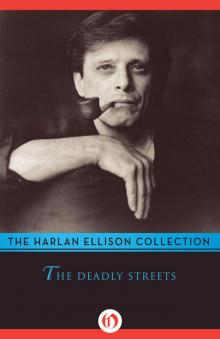 The Deadly Streets
The Deadly Streets The Glass Teat
The Glass Teat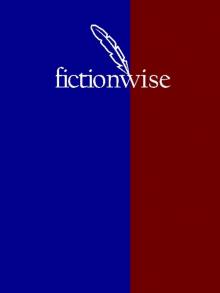 Paingod and Other Delusions
Paingod and Other Delusions No Doors No Windows
No Doors No Windows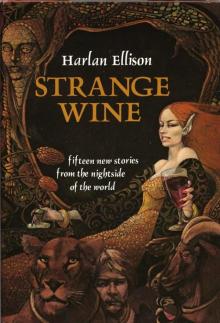 Strange Wine
Strange Wine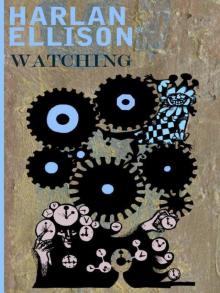 Harlan Ellison's Watching
Harlan Ellison's Watching Over the Edge/An Edge in My Voice
Over the Edge/An Edge in My Voice Troublemakers: Stories by Harlan Ellison
Troublemakers: Stories by Harlan Ellison Gentleman Junkie and Other Stories of the Hung-Up Generation
Gentleman Junkie and Other Stories of the Hung-Up Generation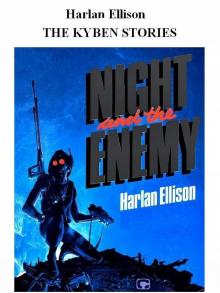 The Kyben Stories
The Kyben Stories From the Land of Fear
From the Land of Fear The Top of the Volcano: The Award-Winning Stories of Harlan Ellison
The Top of the Volcano: The Award-Winning Stories of Harlan Ellison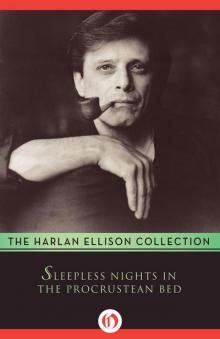 Sleepless Nights in the Procrustean Bed
Sleepless Nights in the Procrustean Bed Ellison Wonderland
Ellison Wonderland Children of the Streets
Children of the Streets Can & Can'tankerous
Can & Can'tankerous Love Ain't Nothing but Sex Misspelled
Love Ain't Nothing but Sex Misspelled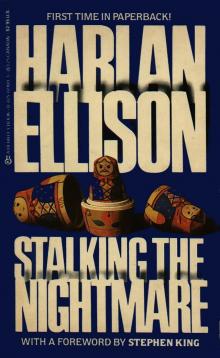 Stalking the Nightmare
Stalking the Nightmare Approaching Oblivion
Approaching Oblivion Deathbird Stories
Deathbird Stories Partners in Wonder
Partners in Wonder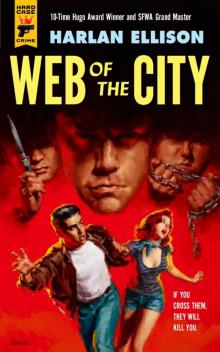 Web of the City
Web of the City Spider Kiss
Spider Kiss A Boy and His Dog
A Boy and His Dog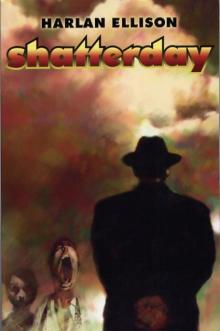 Shatterday
Shatterday Slippage: Previously Uncollected, Precariously Poised Stories
Slippage: Previously Uncollected, Precariously Poised Stories Repent, Harlequin! Said the Ticktockman
Repent, Harlequin! Said the Ticktockman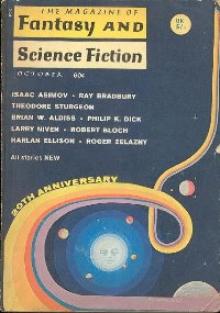 Come to Me Not in Winter's White
Come to Me Not in Winter's White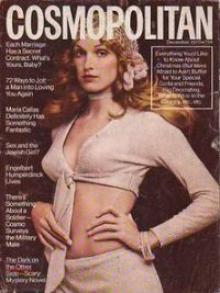 The Song the Zombie Sang
The Song the Zombie Sang The Other Glass Teat
The Other Glass Teat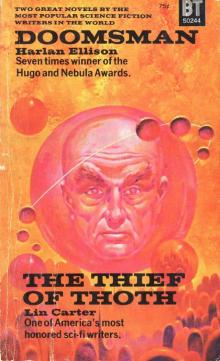 Doomsman - the Theif of Thoth
Doomsman - the Theif of Thoth The City on the Edge of Forever
The City on the Edge of Forever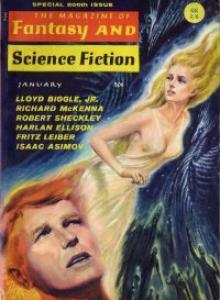 I See a Man Sitting on a Chair, and the Chair Is Biting His Leg
I See a Man Sitting on a Chair, and the Chair Is Biting His Leg The Harlan Ellison Hornbook
The Harlan Ellison Hornbook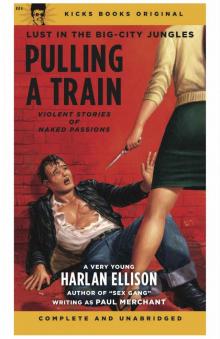 Pulling A Train
Pulling A Train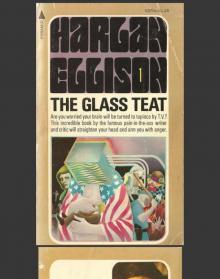 The Glass Teat - essays of opinion on the subject of television
The Glass Teat - essays of opinion on the subject of television An Edge in My Voice
An Edge in My Voice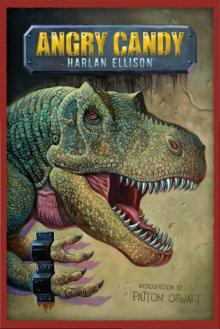 Angry Candy
Angry Candy Troublemakers
Troublemakers The Top of the Volcano
The Top of the Volcano Over the Edge
Over the Edge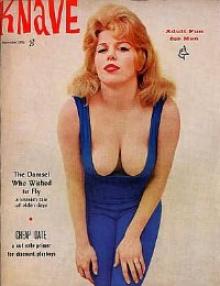 Survivor #1
Survivor #1 Slippage
Slippage